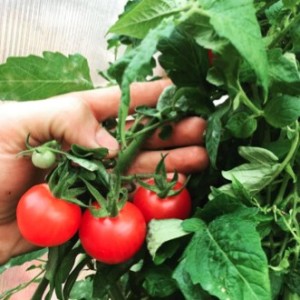Local Food System Case Study: Control Air Community Farm Utilizes Aquaponics to Grow Food for Underserved
April 6, 2016 | OC Food Access
 On a small patch of land nestled in between a busy street, an elementary school, and a row of houses sits a quiet farm that is making big waves in Orange County sustainability. Inside the farm you’ll find rows of arugula, basil, and other crops in raised plant beds connected to tanks of tilapia. It also uses minimal water to operate and produces over 2,000 pounds of food for underserved residents. It’s the Control Air Community Farm in Anaheim, a project of Renewable Farms. It is an aquaponics farm, a farming system that combines elements of aquaculture and hydroponics and it just might be the future of sustainable agriculture.
On a small patch of land nestled in between a busy street, an elementary school, and a row of houses sits a quiet farm that is making big waves in Orange County sustainability. Inside the farm you’ll find rows of arugula, basil, and other crops in raised plant beds connected to tanks of tilapia. It also uses minimal water to operate and produces over 2,000 pounds of food for underserved residents. It’s the Control Air Community Farm in Anaheim, a project of Renewable Farms. It is an aquaponics farm, a farming system that combines elements of aquaculture and hydroponics and it just might be the future of sustainable agriculture.
Aaron Flora and Renewable Farms
Aaron Flora founded Renewable Farms in 2008 as a means to help individuals, businesses, schools, and other organizations learn about sustainable agriculture and build their own aquaponics system. Aaron first became involved in sustainable agriculture while working on service projects while traveling abroad. He started learning more about the needs of the communities he was serving, noting that nutrition was a major concern for many. At the time, he was interested in the concept and science of aquaponics and thought it might be a sustainable solution to many of these problems. He started exploring aquaponics by building a test garden at a church. The garden was a wild success and produced enough delicious food for events and members of the church. As word got out about the garden he built at the church, Aaron was invited to build aquaponics gardens in the community as well as locations all over the world, like Thailand and Chile to name a few.
After spending a few years building gardens and farms abroad, Aaron, a Huntington Beach native, decided to focus  his efforts locally where he would be able to keep an eye on the projects as well as increase his impact by educating others on aquaponics and sustainability. Also, he decided that his services could be just as useful at home in Orange County, because there is just as much need here as there was in the communities he was serving abroad.
his efforts locally where he would be able to keep an eye on the projects as well as increase his impact by educating others on aquaponics and sustainability. Also, he decided that his services could be just as useful at home in Orange County, because there is just as much need here as there was in the communities he was serving abroad.
Aaron has had the opportunity to build farms for schools and other organizations all over Orange County, as well as L.A. and San Diego. Renewable Farms owes much of its success to community support and enthusiasm. After building a farm at a Salvation Army in Anaheim, the mayor of Anaheim commented on a photo of the farm posted on Facebook. Aaron then reached out to the mayor, who helped Aaron get the land where the Control Air Community Farm is built. With Control Air generously funding the project, Aaron and a team of workers and volunteers started building the farm in February 2015. Six months later, they had a complete, thriving aquaponics farm composed of 10 4,000-gallon water tanks and 50 plant beds, each 80 square feet in size.
Staying true to its roots as a service-oriented organization, one of the main goals of the farm is to provide food to the community. The farm is located in a low-income and underserved area of the city, and Aaron says “if the only people that come here are people in a mile radius, those are the people we want to benefit from this… if we can do inexpensive, accessible produce for them, even free, that’s a total win for us.” The farm yields about 2,000 pounds of produce and 1,500 fish a month, and after selling what they need to help keep the farm running, everything else is donated to the community.
Building your own aquaponics system
The best part about Aquaponics systems is that it is a relatively simple system that can be built anywhere. Anaheim isn’t farmland after all, the Control Air Community Farm is even built over asphalt. However, building a successful, healthy system is a major commitment, as it takes a lot of time to learn, construct, and maintain. Aaron’s advice to people who want to build their own aquaponics farm is “just read books,” and emphasizes that in order for the system to work you need to have an in-depth understanding of all its constituent parts.  Instead of studying a quick guide to aquaponics, Aaron says to go right to the basics of the system itself and study topics like aquaculture, vermiculture, and bacteria.
Instead of studying a quick guide to aquaponics, Aaron says to go right to the basics of the system itself and study topics like aquaculture, vermiculture, and bacteria.
If this sounds intimidating, Aaron notes the benefits of gardening, stating “it’s good for your soul” to get your hands dirty. He hopes to bring the benefits of gardening to the people who need it most. He just finished working on a farm for an organization called Amity that helps formerly incarcerated individuals re-assimilate into society, and one of his next major projects includes building a farm at Richard J. Donovan Correctional Facility in San Diego.
Before beginning a project for an organization or school, Aaron first verifies that they have a committed coordinator who is interested in the project and has the time to maintain the garden. He notes that, in schools especially, interest is important because this has a major impact on the students’ enthusiasm for the work as well. Without a committed leader, however, the farm can easily fall apart. When working with an organization, he always begins by asking the same questions: “Who is going to run it?” and “are they excited that they are going to run it?” Experience with gardening is not important, but enthusiasm to work and learn is crucial.
Built by the community, for the community
Aaron has big plans for the future of the Control Air Community Farm. He hopes that it becomes more than just a farm, but also a gathering spot for the neighborhood. He welcomes visitors and kids from the neighborhood to come over to just hang out. Families often stop by to have a picnic, too. He even hopes to build a half-pipe so kids can come over and have somewhere to skate.
If it sounds strange to build a half-pipe on a farm, Aaron insists that the youth are the future of sustainable farming. He hopes that more young people get involved, especially at a young age, so that they have ample time to experiment, hone their craft, and gain the experience needed Interested in volunteering? e-mail Aaron at email hidden; JavaScript is required to build their own aquaponics farm or business. He notes the change in attitudes toward sustainability and jokes that when he goes to schools he’s surprised to find that it’s cool for young people to work in the garden, a great sign that people are acknowledging the importance of farming and food access, and its relevance as a social justice issue. Because aquaponics is a relatively simple system, he is not sure how much more innovative it can become, but hopes that it becomes a major part of sustainable, water-conscious farming.
What can you do to get involved?
Aaron is available to offer his expertise to help others learn about sustainable farming and building an Aquaponics system and hopes to eventually host workshops onsite at the Control Air Community Farm. Aaron has assistance from two interns to help run the farm, but he also relies on the help of volunteers to help keep the farm going and to increase its impact. The farm is open seven days a week and always welcomes visitors. Interested in volunteering? Please e-mail Aaron at email hidden; JavaScript is required
Brought to you by:
This post originally appeared on Grow Local OC: http://growlocaloc.com/oc-food-system-case-study-control-air-community-farm-utilizes-aquaponics-to-grow-food-to-community/













Submit a Comment